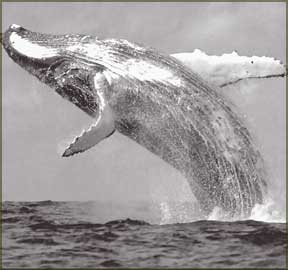‘Protect the Blue Whales before they are lost’
A public lecture on “Protecting the Giants of Our Ocean” was
delivered by marine biologist Asha de Vos, at the Lakshman Kadirgamar
Institute for International Relations and Strategic Studies (LKIIRSS) on
Thursday, April 5.
Asha de Vos leads the first major study of the unique Sri Lankan blue
whale and is committed to scientifically understanding the population to
protect them in the future.

She shared her research findings and experiences with a full audience
at the Kadirgamar Institute auditorium in a well informed lecture full
of new insights and knowledge into Sri Lanka’s blue whales, their
behaviour, the grave and specific threats facing their existence, and
how to protect them. The blue whale is globally ‘endangered’ due to
being hunted for its oil, meat, and other parts by humans in the past,
the total global population being only about 10,000 (from a pre whale
population of about 300,000).
The welcome address at the lecture was delivered by Asanga
Abeyagoonasekera, Executive Director of the Kadirgamar Institute. Arjan
Rajasuriya, veteran Marine Biologist and Research Officer at the
National Aquatic Resources Research and Development Agency (NARA), Sri
Lanka gave an introduction to the speaker and shared memorable
experiences from research expeditions he had undertaken with her.
The Unique Blue Whale of Sri Lanka
Asha de Vos shared with the audience, an answer to a question she has
been asked repeatedly, “Is the blue whale population of Sri Lanka a new
discovery, have they newly migrated to Sri Lankan waters?” She said the
answer to this question is a clear, ‘No’.
She emphasized the uniqueness of the blue whale population in Sri
Lankan waters. referring to them as the “unorthodox whales”, because
they display behaviours different to other populations – for reasons we
are yet to grasp. The longest recorded blue whale in Sri Lankan waters
is 25 m, which makes them 5 m shorter than those found in the Antarctic.
Asha said the biggest threat to Sri Lanka’s blue whales off the southern
coast is ship strikes, as they reside in the midst of one of the busiest
shipping lanes in the world; the most recent strike being on March 20,
2012 when a blue whale came into the harbour on the bow of a ship.
A potential threat to the blue whales of Sri Lanka is the new and
unregulated whale-watching industry. There is an urgent need for the
whale-watching industry of Sri Lanka to adhere to regulations and
international standards de Vos said.
She said she was heartened by the fact that she and her research
vessel went through strict scrutiny of the coastguard as she was
embarking on a research expedition, but said a lot more remains to be
done in the conservation of blue whales in Sri Lanka. |



